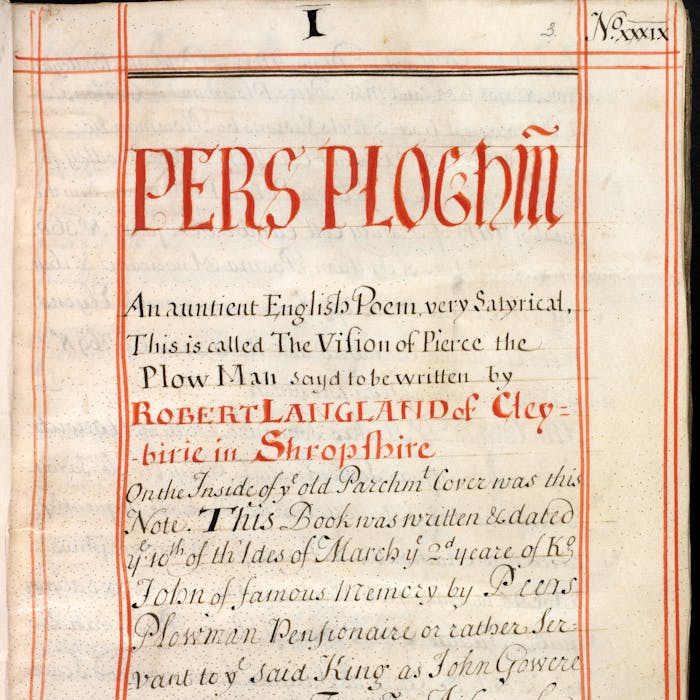
Piers Plowman - Medieval poetic masterpiece
Piers Plowman is a Middle English narrative poem written by William Langland between 1370-1390. It contains the first known reference to the tales of Robin Hood, and is considered by many critics to be one of the greatest works of English literature from its time - preceding and influencing Chaucer's Canterbury Tales.
Composed within a period of major religious, social and economic upheaval, the poem tackles all manner of the dimensions of life in late 14th-century medieval England. The figure of ‘Piers the Plowman’ appears sporadically throughout the poem, sometimes as an honest agricultural labourer, sometimes as Christ himself. Indeed, John Ball, a priest involved as a leader in the Peasants' Revolt of 1381, included Piers Plowman (and other characters) in his writings. This enhanced the satirical elements of the poem's association with Lollardy - the Proto-Protestant movement that called for the reform of European Christianity. Piers Plowman has often been read primarily as a political document.
The poem is set within a series of dream visions, and concerns the narrator's quest for the 'true' Christian life in the context of medieval Catholicism. It includes a search for the allegorical characters Dowel, Dobet and Dobest - 'Do-Well', 'Do-Better', and 'Do-Best' respectively.
It is now commonly accepted that Piers Plowman was written by William Langland, about whom little is however known, though he is said to have come from Cleobury Mortimer, Shropshire. This attribution rests principally on the evidence of an early-fifteenth-century manuscript, which ascribes the work to one man, called 'Willielmus de Langlond'.
There are 50–56 surviving manuscripts of the poem, some of which are fragmentary. Three 'editions' exist - A, B & C - although the B text is the most widely edited and used. Each version represents different manuscript traditions deriving from three distinct and successive stages of the text's creation. Although precise dating is debated, the A, B, and C texts are now commonly thought of as the progressive work of a single author revised over 20-25 years.
Piers Plowman was not published in its entirety until Thomas Whitaker's 1813 edition. From this point on, a modern editorial tradition began, with each new editor striving to present the 'authentic' Piers Plowman, and challenging the accuracy and authenticity of preceding editors and editions. The text - its background, meaning and origin - remains a topic of debate amongst literary and English historical scholars.
Further reading
Links to external websites are not maintained by Bite Sized Britain. They are provided to give users access to additional information. Bite Sized Britain is not responsible for the content of these external websites.
